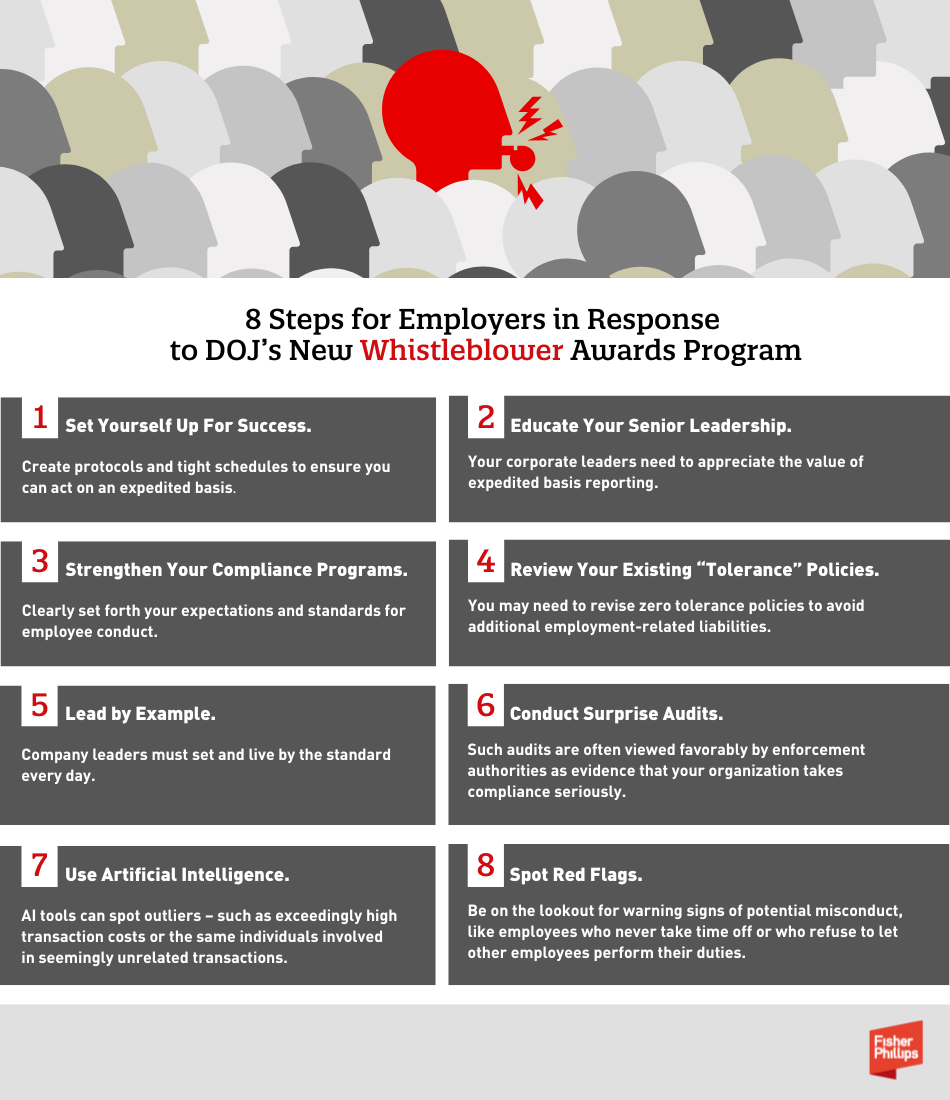The Whistleblowing Just Got Louder: 8 Things Employers Should Do in Response to Feds’ New Whistleblower Awards Program
Insights
10.23.24
A new initiative rolled out by federal officials this summer can reward corporate whistleblowers with up to $30 million – which means it is incumbent upon your organization to step up your game when it comes to corporate compliance. In fact, the Department of Justice’s Corporate Whistleblower Pilot Program (CWPP) gives employees tremendous incentives to report alleged wrongdoing on a very tight timeframe, meaning both public and private corporations need to react with speed and efficiency if they wish to take advantage of valuable cooperation credits for self-reporting. What do you need to know about this new program, why are healthcare and financial services firms most impacted, and what are the eight steps you should take to put yourself in the best position?
Quick Background
Over the past year, the DOJ has launched several new programs to encourage self-reporting of wrongdoing by individuals and corporations.
- As we discussed previously, employees who report on corporate illegality may receive financial awards and non-prosecution agreements – even if they were involved in the wrongdoing.
- Further, corporations that self-disclose wrongdoing may be eligible for non-prosecution agreements and substantially reduced fines.
This latest step aims to keep the whistles blowing, as the DOJ’s new pilot program will impact a broad range of businesses, public and private – but specifically targeting the financial services and healthcare industries.
What’s New?
Under the new CWPP, whistleblowers can receive up to $30 million if the DOJ is successful in obtaining criminal or civil forfeitures from corporate wrongdoers.
- The CWPP is intended to fill a gap by targeting violations involving foreign corruption or bribery and violations related to bribery or kickbacks involving domestic public officials that are not otherwise reportable under existing federal whistleblower programs. For example, federal violations reportable under the False Claims Act are not reportable under the CWPP.
- In addition, the CWPP provides whistleblower financial awards for successful prosecution of financial institutions and for certain healthcare violations committed by private and non-public health benefit programs.
Private Corporation Reach
Perhaps the most notable distinction between the CWPP and other federal whistleblower programs is its reach to privately held entities. The CWPP solicits reporting of federal healthcare offenses where the majority of claims are submitted to private or non-public health benefit plans. Additionally, reporting is encouraged for violations involving fraud where the primary actual (or intended) victims are patients, investors, and other non-governmental entities in the health care industry. Essentially, any federal violation related to healthcare that is not already covered under the Federal False Claims Act may be reported, and rewarded, through the CWPP.
What are the Basic Requirements to Recover an Award?
Whistleblowers are eligible for an award if they meet the following requirements:
- The whistleblower needs to provide the DOJ with Original Information (meaning the DOJ has not received the information from any other source);
- The Original Information leads to a successful criminal or civil forfeiture exceeding $1 million;
- The whistleblower cannot collect an award if they meaningfully participated in the unlawful conduct – but may be eligible if minimally involved; and
- The whistleblower cannot have learned of the unlawful conduct from others at the company who reported the information to them through normal channels.
The Race to the DOJ
Possibly the most challenging part of the new program will be for the alleged offender organization to decide whether it should report alleged criminal conduct to the DOJ. Under the DOJ’s usual sentencing policies, a company must report the allegations to the DOJ before the agency learns of the allegations from any other source to be eligible for cooperation credits. However, under the CWPP, employers can preserve a presumption of declination (i.e., the DOJ declines prosecution) by self-reporting to the DOJ within 120 days of the whistleblower’s internal report.
So, while whistleblowers may be eligible for an increased award if they report internally first, they could miss out on the opportunity to provide Original Information if the organization self-reports to the DOJ first. This creates the “Race to the DOJ” between the whistleblower and the company.
Hence, employers must now expediently investigate the allegation, determine its validity, and respond accordingly – and then determine whether it wishes to report the matter to the DOJ in an effort to avoid prosecution.
What 8 Steps Should Employers Take Immediately?
This new whistleblower program – along with the DOJ’s other recent announcements – reinforce the agency’s goal of creating incentives for self-reporting. Employers need to recognize that employees have tremendous incentives to report alleged wrongdoing to the DOJ on a very tight timeframe and employers must react with speed and efficiency if they wish to take advantage of valuable cooperation credits for self-reporting. You should therefore take the following steps as soon as feasible:
1. Set Yourself Up For Success. Create protocols and tight schedules for all internal investigations. You should have systems in place to recognize allegations that, if true, could lead to criminal or civil liability and forfeitures. You must evaluate these matters on an expedited schedule to ensure your company has the option to obtain cooperation credits from the DOJ.
2. Educate Your Senior Leadership. Make sure your corporate leaders know about the DOJ’s self-reporting programs in advance so that the decisionmakers appreciate the need to evaluate potential reporting situations on an expedited basis.
3. Strengthen Your Compliance Programs. Make sure you have a compliance and ethics program in place to monitor for violations – including well-trained employees who know what to look for and a transparent reporting infrastructure that encourages a “speak up culture.” Your policies must clearly set forth your expectations and standards for employee conduct, provide a mechanism for anonymous reporting, and strictly prohibit any form of retaliation.
4. Review Your Existing “Tolerance” Policies. Because the CWPP forbids retaliation against whistleblowers while also allowing the whistleblower to be a participant in the criminal activity, albeit minimally, you may need to revise zero tolerance policies to avoid additional employment-related liabilities such as wrongful termination.
5. Lead By Example. One of the most important – and often overlooked – aspects of any compliance and ethics program is leadership from the top. Company leaders must set and live by the standard every day. Make sure your highest-level executives lead by example and take part in communicating the importance of these control measures.
6. Conduct Surprise Audits. You should also implement some type of random audits to confirm the validity of transactions and purchases. The mere knowledge that the transactions may be scrutinized could be enough to prevent fraud. Moreover, such audits are often viewed favorably by enforcement authorities as evidence that your organization takes compliance seriously and is actively trying to prevent it.
7. Use Artificial Intelligence. One advanced auditing method involves the use of AI tools to spot outliers – such as exceedingly high transaction costs or instances of the same individuals involved in seemingly unrelated transactions. This can be particularly useful when dealing with vast quantities of information on a global scale.
8. Spot Red Flags. You should also be on the lookout for warning signs of potential misconduct. These often include such things as employees who never take time off or who refuse to let other employees perform their duties (as this could indicate someone is fearful that their fraud will be discovered). Be sure to have an internal system in place for employees to report their concerns (anonymously if they wish). All concerns raised should be promptly investigated and appropriate corrective action must be taken if malfeasance is discovered.
Conclusion
As the DOJ ramps up its efforts to root out illegal corporate conduct, you should review and potentially revise your compliance and employment strategies. If you need assistance, please contact your Fisher Phillips attorney, the authors of this Insight, any attorney in our Corporate Compliance and Governance Group, or any attorney in our Workplace Investigations Group. Make sure to subscribe to Fisher Phillips’ Insight System to get the most up-to-date information on this and other workplace topics sent directly to your inbox.
Related People
-
- Ree Harper
- Partner
-
- Raymond W. Perez
- Of Counsel


